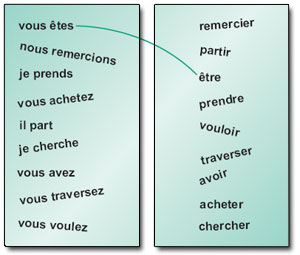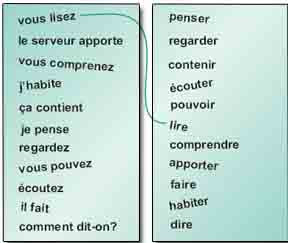Section 2.8
2.8.1 Learning about verbs

You and Christine go to a shop to buy a film for your visit to the museum.
Key Learning Points
Talking about time
Asking for goods and services
Learning about verbs
Using verb forms: nous and vous
Activité 38
Here are some verb forms. Match each one to its infinitive. Look up the infinitives in your dictionary to find out what they mean.
Reliez chaque verbe à son infinitif.

Answer
You should have linked the following:
vous êtes: être to be
nous remercions: remercier to thank
je prends: prendre to take
vous achetez: acheter to buy
il part: partir to leave
je cherche: chercher to look for
vous avez: avoir to have
vous traversez: traverser to cross
vous voulez: vouloir to want
Learning about verbs
Verbs are the words which tell us what is taking place. They describe actions, processes and states. French verbs change their forms according to who or what is responsible for the activity they describe. Highlighted below are some verb forms:
Je cherche la consigne.
l'm looking for the left-luggage lockers.
Le train entre en gare.
The train is coming in to the station.
Nous recommandons le Grand Café.
We recommend the Grand Café.
Je prends du thé.
I have tea.
You won't normally find these forms in the dictionary where the infinitive is used. The infinitive is a basic, impersonal form of the verb. In English it is ‘to + verb’. In French, the infinitive is distinguished by its ending. There are four main groups of infinitive endings:
| -er parler to speak | -re attendre to wait |
| -ir finir to finish | -oir(e) recevoir to receive; boire to drink |
The infinitive of a verb tells you which group it belongs to and can help you predict how it will change in form when used to describe an action.
Activité 39
1. Match the following verb forms to their infinitive and look up their meaning if necessary.
Reliez chaque verbe à son infinitif.

2. Count how many verbs are in each group of infinitive endings.
Combien de verbes dans chaque groupe?
Answer
1. You should have linked the following:
vous lisez: lire to read
le serveur apporte: apporter to bring
vous comprenez: comprendre to understand
j'habite: habiter to live
ça contient: contenir to contain
je pense: penser to think
regardez: regarder to watch, to look at
vous pouvez: pouvoir to be able (to)
écoutez: écouter to listen
il fait: faire to do, to make
comment dit-on?: dire to say
2. You should have noted:
‘-er’ : five verbs
‘-ir’ : one verb
‘-re’ : four verbs
‘-oir(e)’ : one verb
The majority (90 per cent) of French verbs belong to the ‘–er’ group. Verbs which have been introduced into the language more recently fall into this category, for example crasher (’to crash’).
‘-er’ verbs follow a very regular pattern of change. So too do the 7 per cent of verbs which belong to the ‘-ir’ group. Just over 3 per cent fall into a third group, which comprises ‘-oir(e)’ and ‘-re’ verbs which do not follow a regular pattern. Though least numerous, they are also some of the most frequently used, which is why they have retained their form.
Using verb forms: ‘nous’ and ‘vous’
Like je, il and elle, nous (we) and vous (you) are pronouns, that is words which can replace nouns (in this case the names of people). French verbs change their form according to the pronoun which accompanies them.
Here is a table with three of the most common infinitive endings, and the forms that the verbs take when used with nous and vous.
| Infinitive ending | Infinitive | Nous | Vous |
|---|---|---|---|
| -er | fermer (to close) | ferm-ons | ferm-ez |
| -ir | choisir (to choose) | chois-issons | chois-issez |
| -re | vendre (to sell) | vend-ons | vend-ez |
Try to develop the habit of writing out the verb tables which are in your dictionary or grammar book to learn their forms.
Activité 40
Using the information above, work out the nous and vous forms of the verbs in the following table.
Complétez le tableau
| Infinitive | Nous | Vous |
|---|---|---|
| chercher | ||
| aller | ||
| définir | ||
| entendre | ||
| habiter | ||
| remplir | ||
| attendre | ||
| arriver | ||
| développer | ||
| répondre |
Answer
| Infinitive | Nous | Vous |
|---|---|---|
| chercher | cherchons | cherchez |
| aller | allons | allez |
| définir | définissons | définissez |
| entendre | entendons | entendez |
| habiter | habitons | habitez |
| remplir | remplissons | remplissez |
| attendre | attendons | attendez |
| arriver | arrivons | arrivez |
| développer | développons | développez |
| répondre | répondons | répondez |
